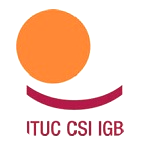2013 has given us a shameful death toll of workplace fatalities and accidents.
Just this week we learnt that of the deaths of over 300 Bangladeshi garment workers following the collapse of their workshop in Savar on the outskirts of Dhaka.
This tragic event took place just days before workers across the world unite on the International Commemoration Day for Dead and Injured Workers, or International Workers’ Memorial Day.
Every year on 28 April we remember the victims of the reckless behavior of employers.
But we must remember that what happened in Savar was not an “accident”.
There are almost 360,000 fatal occupational accidents in any year, and almost two million fatal work-related diseases. Every day, more than 960,000 workers are injured and on average 5,330 workers die because of work-related diseases.
“We receive reports of workers dead, injured or suffering from diseases contracted at their workplaces every day – and even if chronically underreported in official statistics, experts estimate that around a million workers get injured every day!
“What are governments looking at? Don’t they realise that there is a systemic failure when working people have to choose between their own lives and their families’ bread on a daily basis?” asks Sharan Burrow, the General Secretary of the International Trade Union Confederation (ITUC), one of the promoters of the International Workers’ Memorial Day.
In addition to the hundreds of thousands of deaths associated with workplace accidents, we must also remember those who die from occupational diseases such as work-related cancers.
The World Health Organisation estimates the annual death toll from asbestos-related diseases at 107,000 each year.
“When workers in Savar this week tried not to go back to their workplace, arguing about the risks they incurred, their claims were ignored, their voices fell on deaf ears, and this workplace became the graveyard of hundreds of their fellow colleagues,” says Burrow.
“Proper union representation, training, respect and independence for occupational health and safety committees, on-the-ground knowledge of workers – these are all key for these events not to occur in the 21st century.”
Although this shocking tragedy happened in a developing country, the situation in the developed world is not improving.
In the name of competitiveness and public deficit reduction, governments are implementing austerity measures that are eating away at vital regulatory instruments that protect workers and their families.
“Rather than slashing social benefits or public services, leaders should be focusing on the huge cost for the State of letting this massacre go on and focus on prevention and strong health and safety regulation and enforcement,” Burrow concluded.
Migrant workers in Qatar have no labour rights, wages are exploitative and occupational health and safety risks are extreme. Several hundred die each year, and the death and injury toll is rising as the 2022 World Cup gathers pace.
Through International Workers’ Memorial Day, the ITUC hopes to shed light on the crucial role played by trade unions, strong regulation and effective enforcement in securing safer workplaces.
Early indications suggest there will be a record number of workers in 100 countries making a stand for safety on 28 April. Activities include work stoppages, respecting a minute’s silence, flash mobs, art fairs, holding training sessions, undertaking workplace inspections and taking to the streets in demonstrations.









